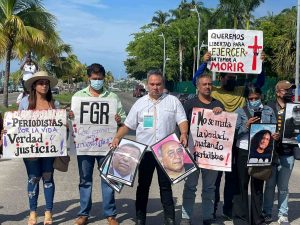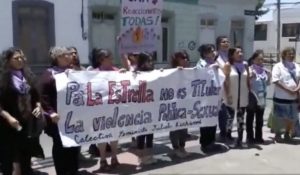Experts say that attacks on journalists in Latin America have increased in recent years due to impunity. The lack of prosecution and punishment for those who threatened, harmed or killed journalists allowed more perpetrators to be found who believed they could get away with it.
UNESCO estimates that 78% of murders of journalists in Latin America between 2006 and 2019 went unpunished. That is, three out of four cases did not or did not result in litigation.
But while murder is the most extreme form of attack against a journalist, other forms of aggression such as harassment, threats and hacking also go unpunished. When officials do not act against aggressors, they are favored.
Journalists seek ways to protect themselves as a result of attacks
We examined the measures taken by journalists to prevent attacks against journalists and the government’s efforts to protect them. But there is a third aspect that is crucial for reducing the frequency of aggression. This is the verdict of the cases.
Over the past two decades, several Latin American countries have established special offices to prosecute crimes against journalists or freedom of expression.
Some of these institutions precede the establishment of protection mechanisms, which is another axis of state strategies to prevent attacks against journalists.
In some countries, special prosecutors have been reformed or renamed due to poor initial results.
However, the situation is not encouraging. After two decades of spurring the creation of institutions dedicated to the protection of journalists, “we haven’t met the goals we set,” Ricardo Trotti, director of the Inter-American Press Association (IAPA), told LatAm Journalism Review (LJR). towards a true administration of justice for ourselves that combats impunity and reduces violence”.
Organizations in Latin America are committed to preventing attacks on journalists.
SIP is the largest group of journalistic organizations in Latin America and the first to promote the creation of private supporters. According to their records, the following countries have established offices to prosecute or investigate attacks on journalists:
Colombia: In 2002 the National Human Rights Unit established a sub-unit to investigate crimes against journalists, but the Office of the Attorney General does not have a special prosecutor.
Guatemala: In 2001, the Special Prosecutor’s Office for Journalists and Trade Unions was established to investigate, prosecute and prevent threats and attacks. However, in 2019 the government split the cabinet in two, with one prosecutor responsible for crimes against journalists and the other for crimes against unions and justice system workers.
Honduras: The Special Advocate for Human Rights Defenders, Journalists, Social Communicators and Justice Operators (Feproddhh) was established in 2018 with the mandate to protect workers to advance human rights and freedom of expression.
Mexican: In 2006, the Special Prosecutor’s Office for Attention to Crimes Against Journalists (FEADP) was established within the Office of the Attorney General. Four years later, due to unsuccessful results, the office was renamed the Feadle, which has the power to “federalize” cases so that they can get cases from local prosecutors.
Also Read | 15 journalists killed in Mexico in 8 months with a crime – almost twice as much as in 2021
Peru: In 2010, the Supreme Court ordered the government to set up a special office to prosecute crimes against journalists and increased the authority of the National Criminal Division and the Lima Criminal Courts to hear such cases. These courts have jurisdiction to hear cases of murder, assault, kidnapping and extortion against journalists.
Organizations have little knowledge of their activities
Clearly, there is no unified model for creating a prosecution to investigate and prosecute attacks on journalists. Some countries have special prosecutors, while others have investigative units.
These institutions were created by legal reforms or, as in Peru, by the Supreme Court. Some special prosecutors also handle cases against other actors, such as human rights defenders, while others limit themselves to journalists.
According to Pedro Vaca, Special Rapporteur on Freedom of Expression of the Inter-American Commission on Human Rights (IACHR), this is one of the reasons why it is difficult to assess the results of these efforts.
“The existence of special prosecutors in countries where violence against journalists is practiced is an important warning of the criminal policy of these states. However, there is an important difference between the announcement, operation and effectiveness of the prosecution,” he said.
“There is little information about effectiveness, especially as there is a significant difference between the models or structures implemented: special prosecutors, investigative units, units within units. Comparisons are difficult,” he added.
Another factor is the lack of knowledge. Some of these offices do not have public websites or contact information.
Lack of trust in authorities
In other cases, journalists are not even aware of the creation or implementation of these offices. Or they know of their existence but do not trust them.
Colombia is an example here, says Raissa Carrillo, legal protection and advocacy coordinator at the Foundation for Press Freedom (FLIP).
“The few journalists who know they have these resources don’t want to go to them,” he said. “There’s a lack of trust in prosecutors similar to that of the National Protection Agency,” he said.
Carrillo said Colombia has a 76% impunity rate for journalist murders, with only three of the dozens reported threats resulting in a punishment for the perpetrators.
“There’s no use going to the authorities,” he said.
Also Read | Colombia becomes 7th country in Latin America where journalists were killed in 2022
Commenting on the Peruvian Supreme Court decision ordering the establishment of a special office, Zuliana Lainez of the Peruvian Association of Journalists (ANP) said the case is more than a decade old, but the decision was never implemented. Instead, cases of attacks on journalists follow the usual channels of judges specializing in human rights.
“We don’t see any specific functionality being implemented to attract these cases. “This is an announcement from ten years ago, but we haven’t heard of any specific measures.”
Lack of consistency and resources in systems to protect against attacks on journalists.
The IAPA has confirmed the creation of these offices, but only to the extent that it has reported that governments are keeping up with their promises to create institutions for the protection of journalists. There are several reasons to be dismayed by the results, said Trotti, who said monitoring was difficult to implement.
“Lack of consistency in public policies is one of them. Governments adopt policies to avoid the problem, but these are not considered government policies, so subsequent governments have led them astray. Before any government, we have to start over.”
Other factors, according to Trotti: “Many states are defensive and resistant to admitting accusations or irregularities in judicial proceedings”.
“In many cases, previous governments are held responsible, so they are not considered state cases; in addition to the fact that many officials are unaware of their functions and existing inter-American case law regarding freedom of expression and violence against journalists”.
And there is a constant lack of resources in journalists’ protection systems. “We still ask governments to provide the necessary professional and financial resources to be efficient.”
LJR has tried to contact the Attorney General of Colombia and the coordinator of criminal prosecutors in Peru for comment, but has so far received no response.
Advising on cases of assault on journalists
In 2020, UNESCO published “Guidelines for prosecutors in crimes against journalists” with recommendations for investigating and taking cases to court.
UNESCO clearly states that journalists should not have a special status, that “all citizens are equal before the law”. However, it acknowledges that “the right to carry out journalistic activities in conditions permitting the realization of fundamental rights must be guaranteed”.
A crucial element, according to the guidelines, is how to determine whether a victim is being targeted specifically because she is a journalist.
For example, investigations into attacks on journalists in Colombia do not have a good analysis of the context, “they do happen, but they are not related to the journalism profession,” Carrillo says.
According to Vaca, methodologies for determining whether a crime was committed because of journalistic work are important for evaluating the results of a Public Ministry or private agency.
Also Read | Chile charges journalists forced to undress during police interrogation
“The next step in building these assets is to determine what information is needed to monitor their effectiveness, how they will be evaluated, and accountability mechanisms,” Vaca said.
“These are necessary things once special prosecutors are created and run.”
Trotti said there are two reasons to be hopeful: Working in the inter-American system allows victims to continue to seek justice after being ignored by authorities in their country.
And organizations like SIP and others are constantly denouncing and presenting cases within this System to keep the issue on the public agenda.
If avoiding impunity for attacks on journalists is a fundamental element of freedom of the press, as UNESCO points out, prosecuting these crimes is essential.
Prompt investigation and prosecution acts as a deterrent for potential criminals.
Javier Garza is a journalist living in northern Mexico. He hosts Expansión Daily, one of Mexico’s most popular news podcasts, and runs local news platform EnRe2Laguna and radio news show Reporte100. He contributes to El País and The Washington Post. He was also a digital security-focused Knight Fellow at the International Center for Journalists.
This article was originally published in LatAm Journalism Review, a project of the Knight Center for Journalism / University of Texas in the Americas. All rights belong to the publication and the author.
Also Read | Reporters Without Borders: 2.7 million tweets attacked the press in the second week of the election campaign
source: Noticias



